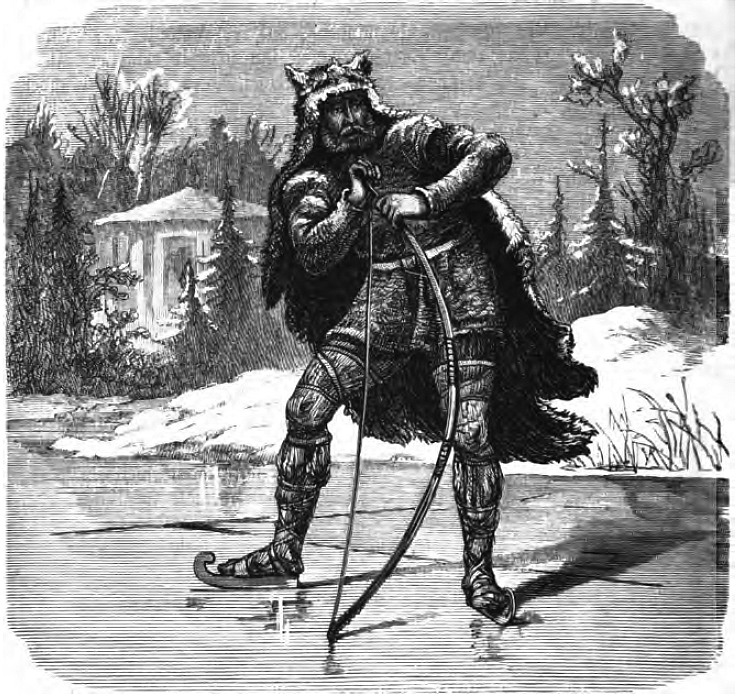|
Ăťdalir
In Norse mythology, Ăťdalir ("yew- dales".) is a location containing a dwelling owned by the god Ullr. Ăťdalir is solely attested in the ''Poetic Edda'', compiled in the 13th century from earlier traditional sources. Scholarly theories have been proposed about the implications of the location. Attestations Ăťdalir is solely attested in stanza 5 of the poem ''GrĂmnismál'' (collected in the ''Poetic Edda''), where Odin (disguised as '' GrĂmnir'') tells the young Agnar that Ullr owns a dwelling in Ăťdalir. The stanza reads (''Ăťdalir'' is here translated as ''Ydalir''): :Ydalir it is called, where Ullr :has himself a dwelling made. : Alfheim the gods Frey gave :in days of yore for a tooth-gift.. Theories Discussing Ăťdalir, Henry Adams Bellows comments that "the wood of the yew-tree was used for bows in the North just as it was long afterwards for England.". Rudolf Simek says that "this connexion of the god with the yew-tree, of whose wood bows were made (cf. ON ''Ă˝bogi'' ' ... [...More Info...] [...Related Items...] OR: [Wikipedia] [Google] [Baidu] |
Ăťdalir (album)
''Ăťdalir'' is the sixth studio album by the Icelandic heavy metal band Skálmöld, released on 18 August 2023 through Napalm Records. Background The Icelandic heavy metal Skálmöld formed in 2009 and released five studio albums before announcing a hiatus in 2020. ''Ăťdalir'' marked the band's return after three years and was its first studio album in five years. The production of ''Ăťdalir'' received a grant of 700,000 Icelandic krĂłnur from the Music Recording Fund () of Iceland's Ministry of Education, Science and Culture. Music and lyrics Like Skálmöld's other albums, the lyrics are themed around Norse mythology. The songs on ''Ăťdalir'' are especially indebted to the poem ''GrĂmnismál'' from the ''Poetic Edda''. Release The first album single "Ratatoskur" was released with a lyric video on 20 June 2023. The second single "VerĂ°andi" was released with a music video on 18 July 2023. "Ăťdalir" was released as a single with a video of Skálmöld performing the song on 15 ... [...More Info...] [...Related Items...] OR: [Wikipedia] [Google] [Baidu] |
Skálmöld
Skálmöld () is a Viking / folk metal band from ReykjavĂk, Iceland, formed in August 2009. The band's name is literally translated as ''Age of Swords'' and also means "lawlessness", referring to the Age of the Sturlungs of Icelandic history, when a civil war broke out between the country's family clans. History Snæbjörn Ragnarsson and Björgvin SigurĂ°sson, who have been friends since childhood and have played together in various collectives, including death metal and punk bands, decided to start a new metal band, Skálmöld, formed in August 2009 in ReykjavĂk. The other band members had also been active in the Icelandic music scene. Initially, the band was intended to be merely a hobby, but the members soon decided to record an album before they were "too old and tired". After contacting most of the Icelandic labels—to no avail—the band was signed by the Faroese label Tutl in November 2010, which released the band's debut album ''Baldur'' in Iceland and the Far ... [...More Info...] [...Related Items...] OR: [Wikipedia] [Google] [Baidu] |
Uller By W
In Norse mythology, Ullr (Old Norse: ) is a god associated with skiing. Although literary attestations of Ullr are sparse, evidence including relatively ancient place-name evidence from Scandinavia suggests that he was a major god in earlier Germanic paganism. Proto-Germanic *''wulþuz'' (' glory') appears to have been an important concept of which his name is a reflex. The word appears as ''owlþu-'' on the 3rd-century Thorsberg chape. Name and origin The Old Norse theonym ''Ullr'' derives from a Proto-Germanic (PGmc) form reconstructed as ''*Wulþuz'' ('Glory'), which is attested in the compound ''owlþu-þewaz'' (ᛟᚹᛚᚦᚢᚦᛖᚹᚨᛉ), meaning either 'servant of ''Owlþuz''' (if interpreted as a theonym), or 'who has glorious servants' (if interpreted as an adjective), found on the Thorsberg chape (3rd c. AD). It is a cognate (linguistic sibling from the same origin) of the Gothic noun ''wulþus'' ('glory, wealth'). They ultimately derive from the Proto-Indo-Euro ... [...More Info...] [...Related Items...] OR: [Wikipedia] [Google] [Baidu] |
